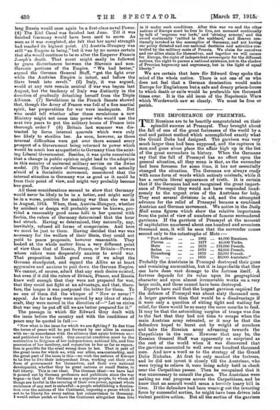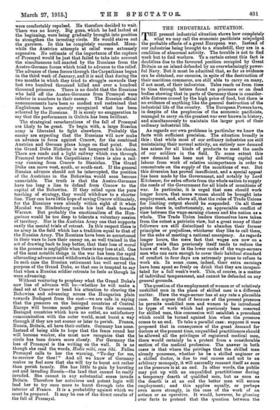THE IMPORTANCE OF PRZEMYSL.
THE Russians are to be heartily congratulated on their JL splendid success at Przemysl. They brought about the fall of one of the great fortresses of the world by a cool and patient method which accomplished exactly what the Grand Duke had designed. The garrison was very much larger than had been supposed, and the captures in men and guns alone place the affair high up in the list of the great surrenders in history. When the Germans say that the fall of Przemysl has no effect upon the general situation, all they mean is that, as the surrender had been foreseen for some time, it has not essentially changed the situation. The Germans are always ready with some form of words which entirely misleads, while it has a certain literal appearance of truth. It is certain that if the Germans had not recognized the great import- ance of Przemysl they would not have responded hand- somely to the urgent cries of the Anstnans for help. They sent several divisions in aid, and the attempted advance for the relief of Przemysl became a combined Austrian and German movement. We notice in the Daily Mail some figures which show the relative .importance from the point of view of numbers of famous surrendered garrisons. If the garrison of Przemysl at the moment of capitulation numbered about one hundred and seventeen thousand men, it will be seen that the surrender comes second only to the catastrophe of Metz:— " Port Arthur ... 1905 ... 44,000 Russian P159119. ... 1877 ... 44.000 Turks.
Metz ... ... 1870 ... 178,000 French. Sedan ....„ 1870 ... 82,000 French. Strassburg .- 1870 ... 23,000 French. Ulm ... 1805 ... 23,000 Austrians."
Probably the Austrians in Przemysl destroyed their guns and remaining ammunition, but it is improbable that they can have done vast damage to the fortress itself. A fortress depends for its value upon its geographical character and upon almost irremovable works on a very large scale, and these cannot have been destroyed. Experts have said that the largest garrison required for the defence of Przemysl was about sixty thousand men. A larger garrison than that would be a disadvantage if it were only a question of sitting tight and waiting for relief, for there would be so many the more months to feed. It may be that the astonishing surplus of troops was due to the fact that they had not time to escape when the main Austrian army retreated, or it may be that the defenders hoped to burst out by weight of numbers and take the Russian army advancing towards the Carpathians in the rear. However that may be, the Russian General Staff was apparently as surprised as the rest of the world when it was discovered that the garrison amounted to well over one hundred thousand men. And now a word as to the strategy of the Grand Duke Nicholas. At first he only masked the fortress, and he did not invest it closely till the Austrians, who were trying to relieve it, were being safely held in check near the Carpathian passes. Then he recognized that it was unnecessary to assault the place. The Austrians were making no real progress across the Carpathians, and he knew that an assault would mean a terribly heavy bill in lives. If the defenders had been wearing out the investing force by successful sorties, he might have been driven into violent positive action. But all the sorties of the garrison were comfortably repulsed. He therefore decided to wait. There was no hurry. Big guns, which he bad lacked at the beginning, were being gradually brought into position to strengthen the investing circle. He would starve out the garrison. In this he completely succeeded. Mean- while the Austrian attempts at relief were extremely expensive. No estimate of the importance of the capture of Przemysl would be just that failed to take into account the simultaneous toll exacted by the Russians from the Austro-German forces which tried to advance to the relief. The advance of these forces through the Carpathians began in the third week of january, and it is said that during the two months in which they tried to struggle onwards they lost two hundred thousand killed and over a hundred thousand prisoners. There is no doubt that the Russians who held off the Austro-Germans from Przemysl were inferior in numbers to their enemy. The Russian official announcements have been so modest and restrained that Englishmen have scarcely recognized what has been achieved by the Russians. It is surely no exaggeration to say that the performance in Galicia has been brilliant.
The strategical reverberations of the fall of Przemysl are likely to be great. To begin with, a large Russian army is liberated to fight elsewhere. Probably the enemy are expecting that the Russians will now make an advance in force against Cracow, for the combined Austrian and German plane hinge on that point. But the Grand Duke Nicholas is not hampered in his choice. There are roads and a light railway which run through Przemysl towards the Carpathians ; there is also a rail- way running from Cracow to Stanislau. The Grand Duke can move west, south, or south-east. If the general Russian advance should not be interrupted, the position of the Austrians in the Bukowina would soon become unenviable. The truth is that the Austro-Germans have too long a line to defend from Cracow to the capital of the Bukowina. If they relied upon the pure teaching of strategy, they would withdraw to a shorter line. They can have little hope of saving Cracow ultimately, for the Russians were already within eight of it when Marshal von Hindenburg made his last dash towards Warsaw, But probably the emotionalism of the Hun- garians would be too deep to tolerate a voluntary cession of territory. Nor is the Austrian Army one that supports easily the mental trials of retreat. In this respect there is no army in the field which has a tradition equal to that of the Russian Army. The Russians have been so accustomed in their wars to lure their enemy on, so well trained in the art of drawing back to leap better, that their lose of moral in the process is negligible when there is any loss at all. One of the most notable things in the war has been the rapid alternating advances and withdrawals in the eastern theatre. In each case the Russian retirement has well served the purpose of the Grand Duke, so that one is tempted to say that when a Russian soldier retreats he feels as though he were advancing.
Without venturing to prophesy what the Grand Duke's new line of advance will be—whether he will make a dead set at Cracow or bend his attention to clearing the Bukowina, and advancing across the Hungarian plain towards Budapest from the east—we are safe in saying that the pressure on the besieged countries of Central Europe will become much greater from this moment. Besieged countries which have no outlet, no satisfactory communication with the outer world, must burst a way through if they are not sooner or later to perish. France, Russia, Britain, all have their outlets. Germany has none. Instead of being able to hope that the fence round her will become weaker, she must now recognize that the circle has been drawn more closely. For Germany the loss of Przemysl is the writing on the wall. It is as though she read the words, Hodie mihi, eras tai. Fallen Przemysl calls to her the warning, " To-day for me, to-morrow for thee ! " And all we know of Germany makes us feel sure that she will try to burst out rather than perish tamely. She has little to gain by bursting out and invading Russia—the land that cannot be really invaded. She cannot in any substantial sense invade Britain. Therefore her notorious and potent logic will lead her to try once more to burst through into the interior of France. It is a probability against which we must be prepared. It may be one of the direct results of the fall of Przemysl.







































 Previous page
Previous page